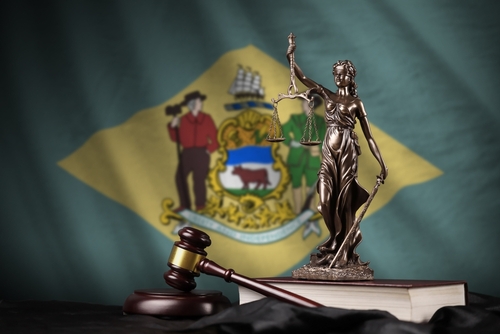Top state court upholds unaffordable bail for 'putative gun-toting drug dealer'

The Delaware Supreme Court has ruled in a case of a man described as a “past-proven and currently putative gun-toting drug dealer.” Image from Shutterstock.
Delaware’s constitutional right to bail does not mean that it must be affordable for dangerous defendants, the state’s top court has ruled.
The Delaware Supreme Court ruled Aug. 30 in the case of Tyrese Burroughs, described as a “past-proven and currently putative gun-toting drug dealer.” Burroughs had argued that he should be released without cash bail or with an affordable bail amount, despite his prior 2019 felony conviction for selling drugs.
The Delaware Constitution guarantees every noncapital defendant the right to receive some amount of bail considered sufficient to permit pretrial release, the state supreme court said.
“It does not follow that that amount must be adjusted downward until proportionate with the defendant’s ability to pay; if it did, all criminal defendants not charged with a capital offense would be guaranteed their freedom before trial regardless of the danger they pose to society or the severity of their alleged offenses,” the Delaware Supreme Court said.
A justice of the peace had set bail for Burroughs at $110,501, which was at the high end of the guidelines range.
After losing an initial appeal in the superior court, Burroughs pleaded guilty to possession of a firearm during the commission of a felony and illegal possession of a controlled substance. He was sentenced to three years in prison and filed a direct appeal.
The state supreme court agreed to rule because the constitutional issue was important and capable of repeating yet evading review.
The Delaware Supreme Court considered four issues:
- Whether the Delaware bail system violates the due process clause of the 14th Amendment
- Whether it violates substantive due process principles stemming from the 14th Amendment
- Whether Burroughs received procedural due process
- Whether Burroughs’ bail violated the Delaware Constitution
The Delaware Supreme Court ruled against Burroughs on all four issues, finding no constitutional violations.
The Delaware constitutional provision at issue says: “All prisoners shall be bailable by sufficient sureties, unless for capital offenses when the proof is positive or the presumption great.”
The state supreme court said it recognizes the state’s bail system is in need of repair. Currently, the system allows a “dangerous, but affluent, defendant to gain pretrial release while a nondangerous defendant without bail resources is detained pending trial.”
A pending constitutional amendment would change the system to allow pretrial detention of those charged with certain felonies when “the proof is positive or the presumption great” that the accused had committed the felony.
But the current system—which allows the detention of defendants who are no less dangerous than wealthier defendants who are released—“is not constitutional in magnitude,” the state supreme court said. “Whether it is tolerable is for the democratic process to decide.”
Hat tip to Bloomberg Law.



